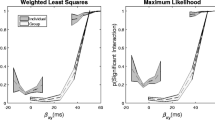Abstract
The present study investigated the strategies involved in the Kohs Block Design task from a cognitive point of view. One purpose was to improve the classical distinction between syncretic and analytic strategies. An other goal was to determine whether subjects show the same strategies according to their field dependence level. Finally, we analysed the way the subjects described their own strategies in order to assess their metacognitive skills.
The subjects (17 year-old pupils) were first given a field dependence proof (G.E.F.T.), then the Kohs Block Design task and finally were interviewed about their strategies. Each pupil was tested individually and videotaped. The strategies were drawn by four indicators.
The results indicated three strategies: syncretic, analytic and synthetic strategies. The degree of field dependence clearly distinguished the strategies in the Block Design task: more independent the subject is, more he used a synthetic strategy. Finally, the subjects’ verbalizations were more closely connected with their behaviours. In a general way, the subjects appeared to be steady in the use of a particular strategy.
Similar content being viewed by others
References
Alexander, W. P. (1950).Une Echelle de Performance pour la Mesure de l’Intelligence Pratique. Paris: Centre de Psychologie Appliquée.
Beuscart-Zephir, M. C., & Beuscart, R. (1988). Tests de Performances: une Méthode d’Analyse des Stratégies de Résolution. Un exemple: le Test de Cubes du WISC R,European Journal of Psychology of Education, 3, 33–51.
Bonnardel, R. (1971).Manuel d’Instructions du B. 101, Cubes de Bonnardel, Editions Scientifiques et Psychotechniques.
Chase, W. G., & Simon, H. A. (1965). Perception in Chess,Cognitive Psychology, 4, 55–81.
Flavell, J. H. (1985). Développement métacognitif. In J. Bideaud, & M. Richelle,Psychologie développementale. Problèmes et réalitée, (pp. 30–41), Mardaga: Bruxelles.
Galifret-Granjon, N., & Santucci, H. (1969). Test adapté de Kohs-Goldstein. In R. Zazzo,L’Examen Psychologique de l’Enfant (pp. 261–289). Neuchâtel: Delachaux & Niestlé.
Hoc, J. M. (1984). La verbalisation provoquée pour l’étude du fonctionnement cognitif,Psychologie Française, 29, 231–234.
Huteau, M., & Lautrey, J. (1978). L’utilisation des tests d’intelligence et de la psychologie cognitive dans l’éducation et l’orientation,L’Orientation Scolaire et Professionnelle 7, 99–174.
Huteau, M. (1981).Cognition et Personnalité. La Dépendance-Indépendance à l’égard du Champ, Volume 2. Paris: Université de Paris V — René Descartes (These: doctorat d’état es-lettres et sciences humaines:, Paris V).
Huteau, M. (1987).Style cognitif: La dépendance-indépendance à l’égard du Champ. Lyon: Presses Universitaires de Lyon.
Jones, R. S, & Torgesen, J. K. (1981). Analysis of behaviours involved in Performance of the Block Design Subtest of the Wisc-R,Intelligence, 5, 321–328.
Nguyen-Xuan, A. (1979). Le fonctionnement cognitif: Qu’y a-t-il eu depuis Human Problem Solving de Newel et Simon?,Bulletin de Psychologie, 32, 625–641.
Schorr, D., Bower, G. H., & Kiernan, R. (1982). Stimulus variables in the Block-Design task,Journal of consulting and clinical psychology, 50, 479–487.
Wechsler, D. (1965).Echelle d’Intelligence de Wechsler pour Enfants (W.I.S.C.). Paris: Centre de Psychologie Appliquée.
Wechsler, D. (1970).Echelle d’Intelligence de Wechsler pour adultes (W.A.I.S.). Paris: Centre de Psychologie Appliquée.
Witkin, H. A. (1985).Manuel du G.E.F.T.: Test des Figures Encastrées, Forme collective. Paris: Centre de Psychologie Appliquée.
Author information
Authors and Affiliations
Additional information
This study was supported by I.N.E.T.O.P. (C.N.A.M.), E.P.H.E. 3rd section, University René Descartes, and C.N.R.S.
Rights and permissions
About this article
Cite this article
Rozencwajg, P. Analysis of problem solving strategies on the Kohs block design test. Eur J Psychol Educ 6, 73–88 (1991). https://doi.org/10.1007/BF03173149
Received:
Revised:
Issue Date:
DOI: https://doi.org/10.1007/BF03173149




